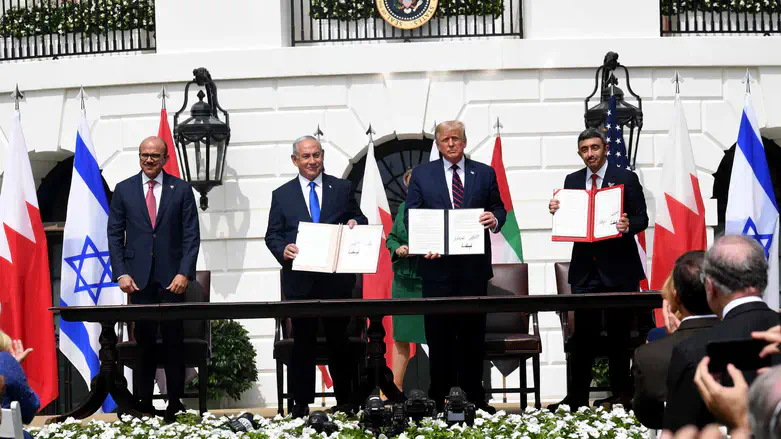
Marking four years since the signing of the Abraham Accords, Asher Fredman, Director for Israel at the Abraham Peace Accords, says, “the survival of the agreements despite the war was not obvious,” and points out that despite the war, the strategic ties with Israel remained, and economic ties even grew. It was not to be taken for granted and it proves that a warm peace, that is also an agreement between nations and not only between leaders, can be strong and stable."
“These agreements,” Fredman emphasizes, also faced quite some pressure that was expressed in the media, on social networks, in demands from countries, such as Turkey and Pakistan, and above all Iran, who is striving to get the agreements canceled. Even so we have maintained their stability. So, what caused this stability, especially in light of the fact that the models of Egypt and Jordan have not reach such a level of ties, despite security and intelligence, and even tourist, interests. Fredman attributes this stability to sharing values of tolerance and coexistence, and a desire for partnership between nations who were different. This is in addition to interests in economic development, innovation and technologies, security and intelligence cooperation with Iran and radical Islamist organizations, such as the Muslim Brotherhood.
Friedman continues to explain that, "the leadership in the United Arab Emirates and Morocco prepared the ground for a warm peace between their nations and Israel. They ensured that Israelis could not only walk around safely in their countries, but would also be welcomed with open arms. We sell water and gas to Jordan and Egypt, and there is some tourism, but there is antisemitic incitement in the public sphere, in the media and in the education system there, and there was never a connection between the peoples, resulting in the fact that when the pressure increased a little, the public pressure was also very stifling. Even though the governments did not cut ties, the very hostile atmosphere affected the leaders’ ability to maneuver moves, which did not happen in the countries of the Abraham Accords, where public opinion has been damaged and we no longer see festivals and large public conferences like before the war. But on the other hand, the leaders said that we are maintaining with ties with Israel, and we will not allow extremists, like Iran's Hamas and the Muslim Brotherhood, to burn these ties."
Fredman believes that "The Palestinian people and their aspirations for an independent state are authentically supported by the people and the leaderships of the Arab countries, including those of the Abraham Accords. They hate Hamas and perceive them as an enemy against them as well. They understand that the Palestinian Authority (PA) is corrupt and have no illusions, like the Europeans, about the PA and Mahmoud Abbas. but they greatly support the Palestinian people and the involvement of these countries in Gaza depends on two conditions:
"One is that Hamas will not rule in the region. As long as Hamas is dominant, they will not enter Gaza. The anticipation of some Israelis that the Emiratis or the Saudis will deal with Hamas will not happen. If and when we totally eliminate Hamas, there is a chance that the Saudis and Emiratis or Egyptians will play a role in the Gaza of the day after,” says Fredman, adding that "They will also want to see steps towards Palestinian independence and Palestinian economic rehabilitation. We will have to communicate with them to understand how far they intend to go, because we have red lines that we cannot give up."
“Despite the great intentions, the Saudis and the Emiratis understand the threat to the existence of Israel from a Palestinian state established in Judea and Samaria, the weakening of population centers, their ability to arm themselves with any weapon, and sign a strategic alliance with Iran and any regional extremist. They understand that Hamas and Islamist elements are gaining strength and that the PA is corrupt and weak. That is why the Saudis stopped aid to the PA several years ago. They also reduced aid to UNRWA, so they understand the situation. On the other hand, they still want to see a better future for the Palestinian people," says Fredman.
"This is where another player comes in, and that is the US. In the context of a possible peace with Saudi Arabia, the question arises as to how far the US is willing to comply with the Saudis' requests on the nuclear issue, a defense alliance, and other points that the Saudis are interested in. This will also affect the Saudi position regarding the Palestinians, and it is not certain that it is an ‘all or nothing’ situation. There are also intermediate measures that we can agree on, and they are less than the establishment of a Palestinian state, that might arm itself and sign agreements with Iran, which they do not want to see."
How can we create such a political framework? "There are many models around the world of countries whose international relations and security is run under the auspices of another country. We need to examine options and models. The Arab world displays a public opinion that supports the Palestinians and is hostile to Israel, but we have seen processes that we initiated and have not yet matured to the end. I estimate that we can find some understanding with the neighbors who want ties with the Jewish people".
